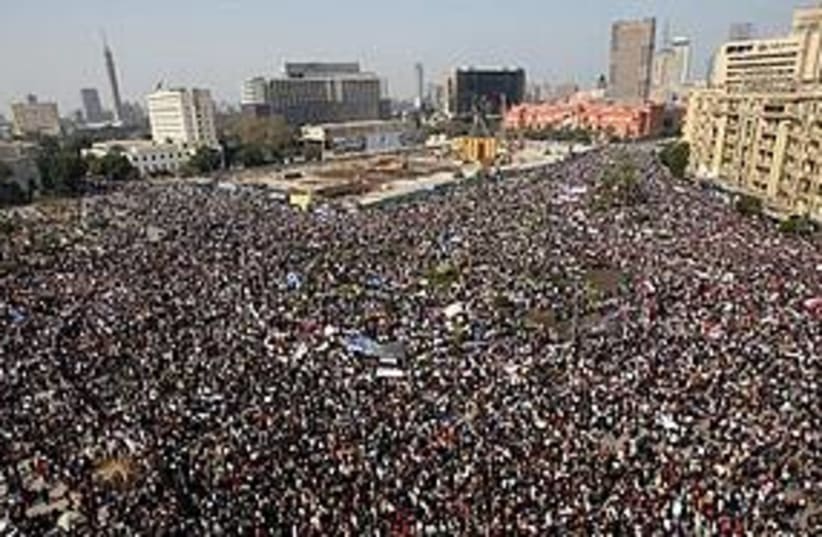Suleiman promises reformsHours after the army said it would not use force on the protesters, Vice President Omar Suleiman — appointed by Mubarak only two days earlier in what could be a sucession plan — went on state TV to announce the offer of a dialogue with "political forces" for constitutional and legislative reforms.Suleiman did not say what the changes would entail or which groups the government would speak with. Opposition forces have long demanded the lifting of restrictions on who is eligible to run for president to allow a real challenge to the ruling party, as well as measures to ensure elections are fair. A presidential election is scheduled for September.Around 30 representatives from various opposition groups were meeting Tuesday to produce a set of joint demands and decide whether to make ElBaradei spokesman for the protesters, said Abu'l-Ela Madi, a spokesman of one of the participating groups, al-Wasat, a moderate breakaway faction from the Muslim Brotherhood.The various protesters have little in common beyond the demand that Mubarak go. Perhaps the most significant tensions among them is between young secular activists and the Muslim Brotherhood, which wants to form an Islamist state in the Arab world's largest nation. The more secular are deeply suspicious the Brotherhood aims to co-opt what they contend is a spontaneous, popular movement. American officials have suggested they have similar fears.In a nod to the suspicions, Brotherhood figures insist they are not seeking a leadership role.Still, Brotherhood members appeared to be joining the protest in greater numbers and more openly. During the first few days of protests, the crowd in Tahrir Square was composed of mostly young men in jeans and T-shirts.On Monday, many of the volunteers handing out food and water to protesters were men in long traditional dress with the trademark Brotherhood appearance — a closely cropped haircut and bushy beards.
ElBaradei: 'Mubarak must resign to prevent bloodshed'
UN Human Rights chief cites reports of up to 300 killed in protests; 200,000 demonstrators fill Cairo's Tahrir Square for Million Man March.

Suleiman promises reformsHours after the army said it would not use force on the protesters, Vice President Omar Suleiman — appointed by Mubarak only two days earlier in what could be a sucession plan — went on state TV to announce the offer of a dialogue with "political forces" for constitutional and legislative reforms.Suleiman did not say what the changes would entail or which groups the government would speak with. Opposition forces have long demanded the lifting of restrictions on who is eligible to run for president to allow a real challenge to the ruling party, as well as measures to ensure elections are fair. A presidential election is scheduled for September.Around 30 representatives from various opposition groups were meeting Tuesday to produce a set of joint demands and decide whether to make ElBaradei spokesman for the protesters, said Abu'l-Ela Madi, a spokesman of one of the participating groups, al-Wasat, a moderate breakaway faction from the Muslim Brotherhood.The various protesters have little in common beyond the demand that Mubarak go. Perhaps the most significant tensions among them is between young secular activists and the Muslim Brotherhood, which wants to form an Islamist state in the Arab world's largest nation. The more secular are deeply suspicious the Brotherhood aims to co-opt what they contend is a spontaneous, popular movement. American officials have suggested they have similar fears.In a nod to the suspicions, Brotherhood figures insist they are not seeking a leadership role.Still, Brotherhood members appeared to be joining the protest in greater numbers and more openly. During the first few days of protests, the crowd in Tahrir Square was composed of mostly young men in jeans and T-shirts.On Monday, many of the volunteers handing out food and water to protesters were men in long traditional dress with the trademark Brotherhood appearance — a closely cropped haircut and bushy beards.